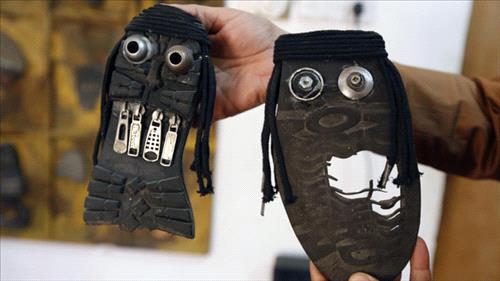Ammon News - AMMONNEWS - The Islamic State of Iraq and Syria (ISIS) militant glares at Baghdad residents with bulging eyes and bared teeth, but neither kidnapping nor death are imminent, because this jihadist is made from a shoe.
A black, treaded sole with the toe broken off serves as his face and nose, while old shoelaces evoke both black headscarf and long hair.
For teeth, zippers dangle into a mouth formed by the space between the heel and toe, and round metal pieces stand in for bulging eyes.
The jihadist is the creation of Iraqi artist Akeel Khreef, who takes worn-out shoes and transforms them into faces representing the “ugliness” of ISIS, which has committed a slew of atrocities in his country.
“I wanted to portray the extent of the criminality and ugliness and ugly acts of the organization’s members,” says Khreef, a 35-year-old architectural engineering professor who is working on a mural of two dozen shoe faces.
ISIS has done much to provoke the anger of Iraqis, leading a June offensive that swept down from the city of Mosul and overran large parts of the country’s Sunni Arab heartland, sowing fear and displacing hundreds of thousands of people.
It has killed thousands of people in areas it controls in Iraq and neighboring Syria, targeted religious and ethnic minorities, sold women and children as sex slaves and destroyed historical sites.
With the faces, Khreef says he wants to portray “the ugly condition” that has prevailed in Iraq since June, and fashioning them from old shoes does so with a calculated insult of an especially Iraqi persuasion.
In Iraq it is considered extremely rude to call someone “waja al-kundara” – literally “face of the shoe”.
“This is what I want to say,” Khreef explains.
In Iraq and elsewhere in the Middle East, it is deemed offensive to even have the bottom of one’s shoes facing another person.
Iraq also has a history of protest by footwear, with a journalist famously hurling his shoes at then US president George W. Bush during a press conference in 2008.
When “you look at the works, you see they are made from remains of waste and worn-out shoes, but they appear sick in their mentalities, and bloodthirsty,” Khreef says.
Embarrass the jihadists
“I will not get them out of my country with this work, but ... I am certain they would be embarrassed by it,” he says.
American officials frequently refer to breaking the “image” or “myth” of ISIS invincibility, but this can come to pass through art and humor in addition to military force.
To obtain supplies for this and other projects, Khreef collects bits and pieces from rubbish bins and buys old shoes from small shops.
“The most important person in my life is the cobbler – he provides me the remains of the worn-out shoes,” he says.
Khreef is sometimes mocked for searching through trash, but wants to convey the idea that “rubbish is not harmful, and can be used for useful things.”
“I work in the street,” he says. “I want the people to know this art.”
Khreef says the project is especially for people displaced by IS.
“I am trying to [ISIS] in the ugliest form to comfort the people who left their homes and to tell them: ‘It is not just the soldier who is with you.’”
The mural Khreef is making is inspired by the organization ISIS – which he refers to as “Daesh,” an Arabic acronym the group rejects – but he wants it to reflect other meanings as well.
“The mural represents the Dawaesh [ISIS members] who live among us, and not just the terrorists,” he says.
For Khreef, a “Daeshi” is “every man who does not love his country and does not love goodness, and believes in death, and rejects the other, and is ready to kill you when you disagree with him.”
IS has a history of greeting even symbolic opposition with kidnapping or brutal violence, and has executed hundreds of people who opposed it in Iraq and Syria.
Artists have fled areas under IS control or have been lying low.
Khreef says he is nonetheless determined to go forward with his project.
“Death is everywhere, and I am not more important than someone who defends his country and carries a weapon and goes to confront the enemy face to face,” he says.
And if the worst happens, “at least I would die believing in a true cause.”
*AFP
